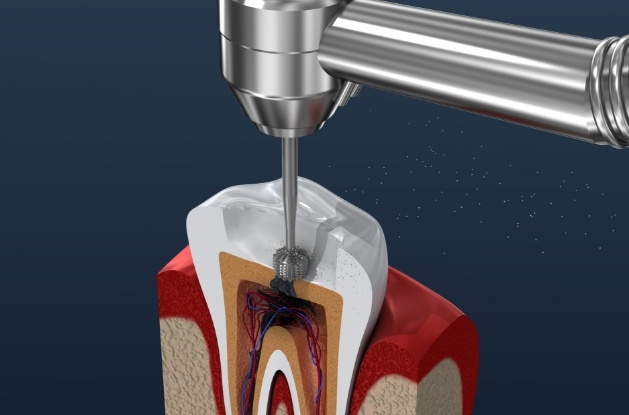Root Canal Treatment – Westfield, MA
Save Your Tooth, Stop Your Pain
The innermost layer of the tooth is called the dental pulp. When the outer enamel is damaged, bacteria can infiltrate the pulp and cause an infection, which often results in extreme pain. When this happens, you might think that your only choice is to have the tooth removed. But with root canal treatment, we can let you keep your natural tooth while also putting a stop to the pain and preventing the infection from spreading further. Call us if you have a tooth that’s showing signs of an infection. Root canal treatment in Westfield could be just what your tooth needs.
Why Choose EMA Dental of Westfield for Root Canal Treatment?
- Multiple General Dentists and Specialists
- Same-Day Emergency Dental Appointments
- State-of-the-Art Dental Technology
Do I Need Root Canal Treatment?

If you’re experiencing any of the following symptoms, you should schedule an emergency appointment:
- Pain when biting down
- Persistent dental sensitivity
- Dark discoloration
- Bleeding, red, or inflamed gums
After we take X-rays and conduct a comprehensive oral exam, we can determine what the root of the problem is. If the decay or infection is extensive, but your tooth can still be saved, then root canal treatment will likely be recommended.
The Root Canal Process

To perform a root canal, we need to create a small opening in your tooth. Then we can take out the pulp along with the bacteria that caused the infection. The pulp chamber and the canals inside the tooth are thoroughly cleaned and carefully refilled. A dental crown will usually be placed afterward to keep the tooth safe. Despite its reputation, root canal treatment isn’t an especially painful procedure; your mouth will be numbed to help you stay comfortable throughout the treatment.
The Benefits of Getting a Root Canal

Root canal treatment often is associated with negative adjectives, like “painful.” However, this restorative treatment comes with several benefits, starting with the fact that the procedure is completely painless thanks to modern techniques and powerful numbing agents. It also stops the infection in its tracks, saving your tooth from needing to be extracted in the process. Lastly, no one will be able to tell that your tooth was treated; the restorations used to cover it moving forward look and feel completely natural.
If you are struggling with dental sensitivity or another abnormal dental symptom, don’t wait – schedule an appointment with us so we can determine if root canal treatment is needed. If that’s the case, you can have peace of mind knowing that we will go above and beyond to make the experience as smooth, stress-free, and painless as possible.
Understanding the Cost of Root Canals

Now that you have a better idea about what root canals are and why they’re sometimes necessary, you’re likely wondering how much they cost. You might not pay the same as someone else because the total depends on your individual circumstances. You’ll need to consult with one of our EMA Dental of Westfield providers before we can create a detailed estimate for you.
Continue reading to learn more about the different considerations that can affect your invoice, and feel free to contact us with additional questions.
Factors That Can Affect Root Canal Cost

Once we’ve had the opportunity to examine the troublesome tooth, then we can provide a quote and walk you through the information for your approval. The final amount owed can be influenced by several factors, including:
- Where the tooth is in your mouth. Molars are more difficult to access and have more roots, driving up the price.
- The severity of your condition. In extreme cases, a specialist like an endodontist might be required, which can cost more.
- Whether additional services are needed. You’ll likely need a dental crown to protect your treated tooth, which comes with its own fees.
Is it Cheaper to Pull My Tooth?

Many patients wonder whether there are less expensive alternative treatments, like extracting the damaged tooth, instead of trying to protect and preserve it. Although extractions seem less costly initially, they do have long-term consequences.
For example, once a permanent tooth goes missing, your jawbone starts to thin because there’s no root to stimulate it every time you bite down. Eventually, it can become too weak to support your remaining teeth, resulting in additional tooth loss. Dental implants can prevent this process but usually cost more than alternatives like dentures or dental bridges. That means you can save money later by mending your damaged tooth with a root canal.
Does Dental Insurance Cover Root Canal Treatment?

Because root canals are considered a major procedure, many dental insurance policies contribute to anywhere from 50% to 80% of the total after you’ve met your annual deductible. However, every plan is different, and yours might have different rules or restrictions that apply, so it’s worth checking the details. Please let us know if you’re struggling to find the information or would like assistance with any claims paperwork. Our friendly office staff is happy to help you maximize your benefits.
Other Options for Making Root Canal Treatment Affordable

Root canals can relieve your pain and save your smile, and we don’t want your budget to keep you from receiving the services you need to improve your oral health. However, we know that not everyone carries dental insurance or can afford the procedure outright. We’ve partnered with CareCredit and Lending Club so that if your application is approved, you can break down your total into more manageable monthly payments that are easier on your wallet.
Root Canal FAQs
Why Do I Need a Root Canal if My Tooth Doesn’t Hurt?
Remember, pain is just one warning sign that something is wrong. When we examine your tooth, we look for other indicators of trouble, like dark discoloration or a pimple-like bump on your gums. In addition to reviewing our findings with you and sharing our treatment recommendations, we will explain why it’s important to move forward with the restorative care you need, even if it doesn’t feel urgent.
How Much Pain is Normal After a Root Canal?
A few hours after you leave our office, the numbing agent will start to wear off. Around this time, it’s normal to experience some soreness, sensitivity, and discomfort. To combat that, we recommend taking OTC pain medication as directed, rinsing periodically with warm saltwater, and using a cold compress. It’s also important that you don’t eat anything crunchy, hard, or sticky, since this can exacerbate your symptoms. Instead, eat soft, nutrient-dense foods, like oatmeal.
What Should I Do Before a Root Canal?
Prior to your root canal, it’s a good idea to make sure you have over-the-counter pain medication, cold compresses, and soft foods at home (or to buy them if you don’t). Additionally, you should avoid using tobacco products, refrain from drinking alcohol, and eat a healthy meal prior to your appointment. Finally, do your best to get a good night’s sleep and choose something comfortable to wear the morning of.
Do I Need Antibiotics Before or After My Root Canal?
Most of the time, patients do not need antibiotics before or after their root canal. That said, there are some exceptions. If you have a health condition that increases the chances of an infection developing, for example, then there’s a good chance that antibiotics will be prescribed.
Important note: Antibiotics cannot be used in lieu of root canal therapy! If you’re interested in learning about your treatment options, talk to our Westfield dental team. We’d be happy to answer any questions you have and provide further insight.
Can Root Canals Be Prevented?
Fortunately, root canals are largely preventable. To reduce your chances of needing one, we recommend committing to good oral hygiene habits at home, including flossing and rinsing with mouthwash consistently. It’s also important that you quit smoking, keep added sugar to a minimum, wear a mouthguard during sports, and visit us twice a year for a dental checkup and teeth cleaning. Together, these best practices will go a long way in keeping your teeth and gums infection-free.
Do Root Canals Make You Sick?
No, root canals do not make you sick. The reason you may have heard this rumor is because research conducted back in the 1920s made this claim. However, it’s been disproven many times over the years. In fact, the opposite is true: if you don’t get a root canal when you need one, your oral and overall health can suffer greatly!
Are Root Canals Painful?
Of course, one of the most asked questions about root canals is, “Are they painful?” If you’ve been wondering the same thing, we have good news for you: your mouth will be thoroughly numbed beforehand. Plus, you’ll be given helpful aftercare instructions, like using a cold compress and rinsing with warm saltwater periodically, to ensure you stay comfortable while you recover.
Important note: Any soreness, sensitivity, or discomfort you experience following your procedure should subside in a day or two. If your symptoms persist or get worse, then call us ASAP.
Do I Still Need a Root Canal if My Toothache Went Away?
If your toothache goes away overnight, you might assume that you can cancel your appointment. Don’t! When the infection is left alone to progress, it can “kill” the nerve, rendering it unable to register pain. While that does mean your symptoms will go away, the root of the problem is very much still present. So, it’s still important that you come to our office for the necessary restorative care.
How Long Does it Take to Recover from a Root Canal?
The length of your recovery period will depend on a few factors, including how many teeth were treated. With that said, most patients are able to return to work or school the following day. Ultimately, the key to healing comfortably is following all of the aftercare instructions provided, like eating only soft foods, not chewing on that side of your mouth, and taking OTC pain medication as directed.
Can I Eat Before a Root Canal?
That depends largely on if you’re being sedated for the procedure. If you are, then you’ll likely be asked to fast beforehand to prevent you from feeling nauseous. If you aren’t, then you can eat a healthy, well-balanced meal the morning of. Just make sure that you don’t drink alcohol or smoke since that could negatively affect everything from the local anesthetic used to numb your mouth to how well you heal.
What Happens if You Wait Too Long for a Root Canal?
Patients are often tempted to take the “wait and see” approach, especially if they struggle with dental-related anxiety or are worried about the cost. However, the longer you wait, the more time the infection has to progress. You also run the risk of the tooth in question being damaged beyond the point of repair and, at that point, a root canal won’t be an option anymore. So, truly, the best thing for your smile and your wallet is to get a root canal when we first recommend it.
Do Root Canals Ever Have to Be Redone?
Although rare, root canals do sometimes need to be redone. Usually, it’s due to an unexpected complication, like saliva contaminating the tooth during the procedure. Rest assured, we’ll do everything in our power to prevent that from happening, and we’ll provide you with detailed aftercare instructions to prevent new decay from forming as well.
